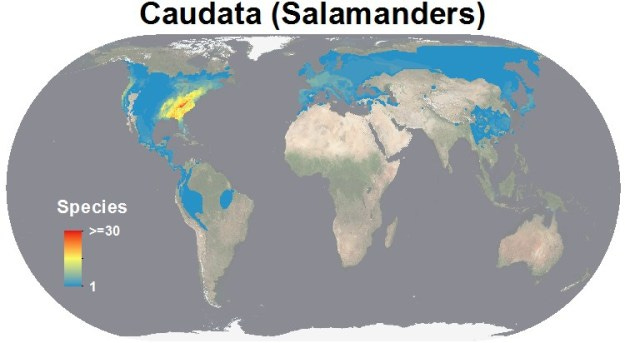Friday recommended reads # 17
What do journal impact factors really mean? For starters, impact factor predicts retraction rates better than long-term citation rates.
Who doesn’t love critters and maps? Here’s a brand-new site with high quality biodiversity maps, by Clinton Jenkins. On my first browse, I learned that the real salamander diversity in in the Smokies:

My family went to see the anti-consumerist Lego Movie and really liked it. Here’s an article in The New Republic, putting the competing views of the movie’s social commentary into context. (By the way, here’s the old post about female Lego field biologists.)
My favorite new academic blog is Good Enough Professor about teaching and scholarship in the humanities, with many lessons for scientists, and everybody else, too.
What should a manuscript review look like? The British Ecological Society put together a great pamphlet for novice reviewers (it’s a pdf.). It also would be great for giving to someone outside academia who wants to really understand what “peer-reviewed” means.
Here is a compelling news item from NPR, about a long-term demographic study, that was depressing, discouraging, and fascinating, about how “race is socially constructed,” and not in a good way. It’s definitely worth the five-minute listen.
We really do have to keep making the point to girls, again and again, that you really can do what you want to do. Here is a touching story about a girl discovering that she can grow up to have the career she wants.
The thylacine went extinct a good long while ago, so I was surprised to see there is video footage of the last one.
If you sample material from the last known individual of a tree species, and then it dies from an infection, well, that’s not a good thing.
How do you get the public to be aware of the importance of taxonomy? I guess you could name a beetle after David Sedaris. Is that pandering?
Some education reform knuckleheads want to impose a “college readiness exam” on students enrolled in college before they can receive a federal Pell grant. Tressie Cottom explains how this is as paternalistic and a back-door discriminatory filter like a poll tax: “If you know the kind of racialized, gendered and classist segregation that defines who is and who is not “college ready” AND you concede by ideological imperative that knowledge is a type of capital, then what is a readiness test, exactly?”
Please add additional links you’d like to suggest in the comments.
Thanks to @phdbee, @myrmecos, @leafwarbler, and @TrevorABranch for leads.


